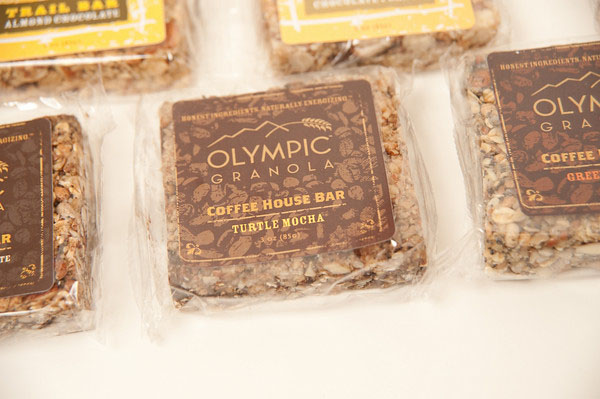
Olympic Granola bars have an unusual pedigree. The company that originally developed them seven years ago was based out of the Olympic Mountain Region of Washington, but it was acquired two years ago and given a marketing makeover by Bill Forsman of North Branch, MN.
 The 3 oz. bars were named one of the top two ecofriendly energy bars out of a field of 28 by the Sierra Club, and boast short, comprehensible ingredient listings that are free of trans-fat, wheat, and dairy. From a taste perspective, they stand out from their competition, managing to be simultaneously crispy (and not sticky), soft, and chewy, yet substantial and energy-packed.
The 3 oz. bars were named one of the top two ecofriendly energy bars out of a field of 28 by the Sierra Club, and boast short, comprehensible ingredient listings that are free of trans-fat, wheat, and dairy. From a taste perspective, they stand out from their competition, managing to be simultaneously crispy (and not sticky), soft, and chewy, yet substantial and energy-packed.
The Roasted Almond Trail Bar, for example, recalls an almond-inflected Rice Krispie treat minus the cloying sweetness — there’s a crisp, crunchy lightness to this bar that is different from the typical hard, high-density material that we’ve come to identify as “granola.” A roasted flavor adds depth, and while the bar is crunchy, it’s also soft, touched with a bit of honey and sunflower seed flavor.
An Espresso Almond Chocolate Coffee House Bar has an authentic and assertive note of coffee that jumps out at the taster, supported by subtle bittersweet chocolate based on a foundational layer of almond. Like everything Olympic puts out, the Espresso Almond bar packs a flavor and nutritional wallop, weighing in with 390 calories, 9g of protein, 23g of sugars, and 6g of dietary fiber. If you’ve been kayaking or landscaping all afternoon, this thing will put you back on your feet. If you’ve been off your feet, it may keep you there.
Locally available all over the place (Lunds, Kowalski’s, The Wedge, etc.), Olympic Granola bars aren’t cheap, clocking in at around $3. That said, you get what you pay for: a substantial, nourishing, tasty granola bar that packs surprisingly deep layers of flavor.

Olympic granola (olympia granola) is a pricey and disgusting way to load your body with calories.The lemon chamomile is the least gross, but definitely reminds me of lemon Pledge…